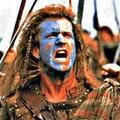Braveheart is a 1995 American epic/drama film directed by and starring Mel Gibson. The film was written for the screen and then novelized by Randall Wallace. Gibson portrays William Wallace, a Scottish warrior who gained recognition when he came to the forefront of the First War of Scottish Independence by opposing King Edward I of England and subsequently abetted by Edward's daughter-in-law, Princess Isabelle of France and a claimant to the Scottish throne, Robert the Bruce. King Edward I of England, known as "Longshanks", has occupied much of southern Scotland, and his oppressive rule there leads to the deaths of William Wallace's father and brother. Years later, after Wallace has been raised abroad by his uncle, the Scots continue to live under the iron fist of Longshanks' cruel laws. Wallace returns, intent on living as a farmer and avoiding involvement in the ongoing "troubles". Wallace seeks out and courts Murron, and the two marry in secret to avoid the decree of primae noctis the King has set forth. When an English soldier tries to rape Murron, Wallace fights off several soldiers and the two attempt to flee, but the village sheriff captures Murron and publicly executes her, proclaiming "an assault on the King's soldiers is the same as an assault on the King himself." In retribution, Wallace and several villagers slaughter the English garrison, including the sheriff. Wallace, the men from his village, and a neighbouring clan enter the fortress of the local English lord, killing him and burning it down. In response to Wallace's exploits, the commoners of Scotland rise in revolt against England. As his legend spreads, hundreds of Scots from the surrounding clans volunteer to join Wallace's militia. Wallace leads his army through a series of successful battles against the English, including the Battle of Stirling Bridge and the sacking of the city of York. All the while, Wallace seeks the assistance of young Robert the Bruce, son of the leper noble Robert the Bruce and the chief contender for the Scottish crown. However, Robert is dominated by his scheming father, who wishes to secure the throne of Scotland to his son by bowing down to the English, despite his son's growing admiration for Wallace and his cause. Two Scottish nobles, Lochlan and Mornay, planning to submit to Longshanks, betray Wallace, who is defeated at the Battle of Falkirk but saved at the last instant by Robert, who was fighting on the English side. Wallace goes into hiding, fighting a guerrilla war against English forces, and personally murders Mornay and Lochlan for their betrayal. Meanwhile, Princess Isabelle of France (whose incompetent husband Prince Edward ignores her) meets with Wallace as the English king's emissary. Having heard of him beforehand and after meeting him in person, she becomes enamored with him and secretly assists him in his fight. Eventually, she and Wallace share a tryst, in which she becomes pregnant. Still believing there is some good in the nobility of his country, Wallace eventually agrees to meet with Robert the Bruce in Edinburgh. Wallace is caught in a trap set by the elder Bruce and the other nobles, beaten unconscious, and handed over to the English. Learning of his father's treachery, the younger Bruce disowns his father. In London, Wallace is brought before the English magistrates and tried for high treason. He denies the charges, declaring that he had never accepted Edward as his King. The court responds by sentencing him to be "purified by pain." After the sentencing, a shaken Wallace prays for strength during the upcoming torture and rejects a painkiller brought to him by Isabelle. Afterwards, she goes to her husband and father-in-law, begging them to show mercy, but they refuse; she retaliates by tormenting the terminally ill and mute King with the knowledge she is pregnant with Wallace's child. The torture takes place in a London square, where he is to be disemboweled. Awed by Wallace's courage, the Londoners watching the execution begin to yell for mercy, and the magistrate offers him a quick death in exchange for a plea for mercy. Using the last strength in his body, William instead cries, "Freedom! ", and the judge, deciding that nothing more can be done, orders the end of the execution anyway. Just as he is about to be beheaded, Wallace sees an image of Murron in the crowd smiling at him, before the blow is struck. Some time later, Robert the Bruce (now King Robert I), leads a strong Scottish army and faces a ceremonial line of English troops at the fields of Bannockburn in 1314. Invoking Wallace and his desire for freedom among his troops, he leads them into battle. A voiceover, by Gibson, states that the Scots won their freedom in that battle.

Movies, series, Braveheart
To hear audio for this text, and to learn the vocabulary sign up for a free LingQ account.
